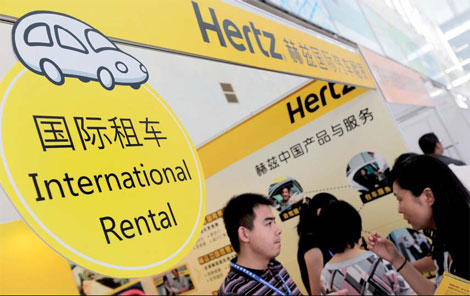Hertz seeks public support
Updated: 2011-12-30 07:41
By Wang Chao (China Daily)
|
||||||||
|
Most of Hertz China's revenue comes from international customers, but the car rental company also hopes to seize business opportunities in the local market. [Provided to China Daily] |
Car rental giant ready to shift into overdrive
To remain viable, American car rental giant Hertz Global Holdings Inc is diversifying its services in China instead of just relying on multinational companies for cash.
"China is a country with a huge population, so to serve foreigners and multinationals is less than enough," says Susan Xu, marketing director of Hertz China.
Established in 1918, Hertz has more than 8,000 offices in 146 countries. It is the largest car rental company in the United States, owning 30 percent of the car rental market at major US airports.
In Europe, it is the third-largest car rental company, with 69 airport locations.
Last year, the company's revenue from its car rental business totaled $6.5 billion worldwide.
Hertz China is contributing a very small fraction to its global revenue, the company admits, although it entered China in 2002. Like all car rental companies in China, its corporation is still financially supporting Hertz China.
"Hopefully in three years, we can break the balance when customers have accumulated," Xu says.
Currently, 80 percent of its revenue comes from multinationals who have signed global contracts with Hertz, Xu says.
"In 2002, the Chinese operations were established mainly to serve customers who needed to rent a car overseas. But in 2009, Hertz realized the potential of the local market and decided to switch the focus," Xu says.
Hertz made a great leap this year. It added three outlets in China: Tianjin, Chengdu and Shenzhen. Between 2002 and 2010, it had only two offices in China - one in Beijing and another in Shanghai.
In August, Hertz China partnered with GE to sign an agreement with the Shanghai government to roll out electric car rentals, sending the message that Hertz is tightening its relations with local governments.
To better communicate with Chinese clients, Hertz hired Chinese managers and salesmen and saleswomen to explore the local market. Even the CEO frequently visits China.
At the same time, it is targeting the rising Chinese middle-class consumers who travel abroad for fun. According to the National Tourism Administration of China, outbound travel increases by 20 percent in China every year.
"There is huge potential in this segment," Xu says. "As we have nearly 150 locations around the world, we have advantages in offering the global services."
Hertz China plans to work with its travel agent partners to extract more business from travelers heading overseas. It is also promoting its global solutions program by offering special services to attract individual customers.
Hertz China helps Chinese drivers apply for international licenses and foreigners obtain the proper paperwork for Chinese licenses.
Xu agrees that the dependence on multinationals is a double-edged sword for Hertz. "In terms of corporate clients, we are already ahead of many competitors, thanks to our multinational ties; but we are not very successful in the consumer market," Xu says.
Ou Guoli, a professor from Beijing Jiaotong University with research focus on transportation, says Hertz has to move beyond its global network. "In China, multinationals are a big market segment for car rental companies. But more potential lies in individual customers."
He adds that Hertz is a brand for ordinary consumers in international markets, and it should reinforce that idea in China.
However, Hertz's expansion efforts seem conservative when considering its Chinese competitors.
Compared to Hertz's five offices, eHi Car Service has 300 outlets in 50 cities and Topone Car Rental has opened outlets in 26 cities.
"We want to make sure the business is profitable before we move on," Xu says. "Scale is not our major concern right now."
As a pioneer of car rentals, Hertz's practices have been copied by latecomers - to offices inside airports, the ability to return cars to different cities, and offering GPS devices and mobile phone services inside the car.
However, when this system was brought to China in 2002, Hertz found it hard to sustain because individual customers were scarce. Reports of fraud and car damage were consistently occurring, and there were no laws or regulations outlawing these types of activities.
Running a car rental business in China is much more costly than in the US, too, Xu says, because the company has fewer channels to get rid of older vehicles.
"In the US, Hertz (typically) signs agreements with car manufacturers who buy back the used cars after one to two years at a good price," she says. "But (here), we are working together with the global headquarters to negotiate the purchase price (with manufacturers)."
Huang Zhibiao, marketing director of Topone Car Rental, says the Chinese market is very different from the US, and foreign companies, such as Hertz, have to adapt to this condition to survive in this country.
"In China, many customers prefer to hire a driver when renting a car instead of driving cars by themselves. Besides, long-term rentals from companies are contributing much more than individual customers," Huang says.
"Foreign companies have to consider these differences before they expand."












